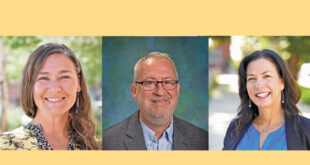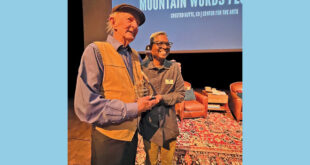By Dawne Belloise
One of Crested Butte’s most beloved festivals got some global exposure recently. Vinotok founders Marcie Telander and Mark Schwiesow were contacted by a presenting group to bring a mini Vinotok troupe to perform in an international forum in Potsdam, Germany, May 17 through 19. Other festavarian members, KT Folz, Isabel Popke Russell, Chad Reich, Eric DiMarco and Jo Ellipsis, also flew over to perform and partake in the discussions. The event was called The European Forum for the Study of Religion and the Environment.
The focus of the forum questioned if arts and celebration can be used to bring a community together to advocate for the environment, however, Telander tells that the discussions had been mostly academic. “There was a lot of talking around the idea but with no experience of how it can really happen.” She added that the conference organizers were excited about the Vinotok clan performing as well as lecturing because, “It showed them that it really can be done and how it’s done.” The troupe returned triumphant in their pursuit to share with others the story, history and philosophy of the Crested Butte community’s beloved autumnal equinox celebration.
At the conference, titled Myths, Ritual and Practice for the Age of Ecological Catastrophe, Telander says, “We sank into the German community and the community that we met at the conference. The venue itself was amazing and was so incredibly transformational.” She adds that the power of the place was also in its historicity, “Although the wall that had divided Berlin and Potsdam has been removed except for historic parts of it, it’s still part of their historical, psychological and emotional culture.”
The forum was a gathering of religious leaders, spiritual explorers, academics, artists and activists. At the university, Schwiesow and Telander presented an academic panel discussion on performance activism, cultural animation and the practice of Vinotok villages of vision. “Practicing ecology justice and artful activism as foundations for community healing,” Telander says and further explains, “Practice for preserving the wild in rural and urban communities and ways to elevate and celebrate others’ local cultures and environment.”
During the presentation, the rest of the Vinotok group acted as docents or guides passing out handouts describing in detail the philosophy and focus of the Vinotok village celebration process. They created an installation of banners with the images of the major Vinotok characters plus altars set up in the presentation space. Information at each altar gave a look on how others could conduct their own personal pilgrimage Vinotok. And of course, there were grump boxes. “People throughout the conference were surrounded by the images of Vinotok, even though it was an academic panel. We created a sacred space,” Telander says.
Telander says that people who attended the conference were intrigued and wanted to know more. “The questions were very poignant and personal. They wanted to know how to do this in their communities and what it takes to bring environmental responsibility.” Telander also felt that the conference was doing something very radical but very ancient: “Looking at mythology as a potential form of healing. This is why they were so interested in an experience like Vinotok, that it could exist in practicing eco-cultural ritual, ceremony and environmental protection and preservation.”
The performance space itself was unique and awe inspiring, according to Telander, as it was a converted Nazi bunker that was dug many levels deep into the ground but now transformed into multiple stories of waterfalls, jungle and rainforest with varying species of plants, animals, butterflies and reptiles. “It was actively changed to a living organism, the opposite of its first design,” she says.
The Vinotok performance was held in a huge glass solarium attached to the bunker. “The walls were lined with living plants so our stage and backdrop were a living, thriving organic nature.” They created the Vinotok passion play and the mumming, performing around people and tables and the trial of the Grump. Popke Russell, who represented the Red Lady, sang the mumming song of Oats and Corn in German. Folz represented the Harvest Mother, Ellipsis represented the Earth Dragon, DiMarco was the Green Man, Schwiesow represented Sir Hapless the Knight, Telander was the Magistrate, Reich was the Executioner and Grump Master. The entire audience joined in the ritual of marrying the earth through the Harvest Mother.
The audience was then invited to experience this rite of passion and afterward, they led the Grump procession into an open courtyard and sacrificed him by drawing and quartering the effigy since fire wasn’t feasible. “We danced around with drumming and dry ice was the closest we could get to smoke fire. Everybody was glad the Grump was dispelled and banished. Very few people wanted to leave, and so we took the post Grump ceremony out to the van we had rented and had a tailgate party for dozens of people which later moved to the university pub,” Telander tells. “We were part of an international think tank discussing a world of environmental catastrophe and we were honored to be part of that.”
Schwiesow also felt, “There were great minds from all over the world. I personally met people from 12 different countries but there were many more. It felt very much like a think tank more than a conference. These people had decades of getting together to look at the global issues surrounding the environment. What I learned there was that those mega thinkers are always looking toward other cultures for solutions instead of to their own communities,” and that brought the concept home to him of how we’ve looked toward our own community for answers and solutions. “It’s what we’ve done for 50 years. What I think they learned from us and the Vinotok experience is that you can start with the whole idea of thinking globally and acting locally but many didn’t realize that they should start looking at the stories of the place that they come from and to reexamine what their own resources are in their own towns. Environmental solutions are not what you can extract but what you give. What we’ve done here in our community and what Vinotok does is that environmentally, we come not as thieves but with offering.”
 The Crested Butte News Serving the Gunnison Valley since 1999
The Crested Butte News Serving the Gunnison Valley since 1999




